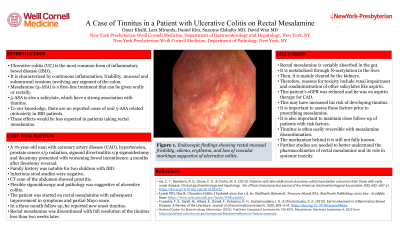Back


Poster Session D - Tuesday Morning
Category: Colorectal Cancer Prevention
D0181 - A Case of Tinnitus in a Patient With Ulcerative Colitis on Rectal Mesalamine
Tuesday, October 25, 2022
10:00 AM – 12:00 PM ET
Location: Crown Ballroom

Has Audio
- OK
Omar Khalil
Weill Cornell Medical College
Manhattan, New York
Presenting Author(s)
Omar Khalil, 1, Lara Miranda, 1, Daniel Kim, 1, Suzanne Elshafey, MD2, David Wan, MD3
1Weill Cornell Medical College, Manhattan, NY; 2New York Presbyterian-Weill Cornell Medical Center, Manhattan, NY; 3New York-Presbyterian Hospital/Weill Cornell Medicine, New York, NY
Introduction: Ulcerative colitis (UC) is the most common form of inflammatory bowel disease (IBD), with a prevalence of 156 to 291 cases per 100,000 per year. It is characterized by continuous inflammation, friability, mucosal and submucosal erosions involving any segment of the colon. Mesalamine (5-ASA) is a first-line treatment that can be given orally or rectally. Mesalamine is also a salicylate, which have a strongly documented association with tinnitus. To our knowledge, however, there are no case reports of IBD patients treated with oral or rectal 5-ASA having otic side effects. Thus, it is important to recognize this potential side effect of mesalamines, even if only used rectally.
Case Description/Methods: A 76-year-old man with hypertension, coronary artery disease (CAD), prostate cancer status post radiation, sigmoid diverticulitis with pelvic abscess requiring sigmoidectomy and ileostomy status post reversal who presented with worsening bowel incontinence four months after ileostomy reversal. Family history was notable for two children with IBD. Infectious stool studies were negative. CT scan of the abdomen showed proctitis. Flexible sigmoidoscopy was performed, and pathology was suggestive of ulcerative proctosigmoiditis. The patient was started on mesalamine enemas with subsequent improvement in bowel incontinence. However, within three months, he developed tinnitus. Rectal mesalamine was discontinued with full resolution of the tinnitus less than two weeks later. To control his proctosigmoiditis, budesonide foam was used with a complete clinical response.
Discussion: Rectal mesalamine is variably absorbed in the gut and is mainly cleared by the kidneys after N-acetylation in the liver. Possible reasons for toxicity include liver or renal impairment or coadministration of other salicylates like aspirin. Although this patient had normal liver function, his eGFR was reduced and he was on aspirin therapy for CAD, which may have increased his risk of developing tinnitus. It is important to recognize this potential complication of mesalamine, and assess these factors prior to prescribing mesalamine, counsel patients, and maintain close follow-up of patients with risk factors, as tinnitus is often easily reversible with mesalamine discontinuation. Further studies are needed to better understand the pharmacokinetics of rectal mesalamine and its role in systemic toxicity.
Disclosures:
Omar Khalil, 1, Lara Miranda, 1, Daniel Kim, 1, Suzanne Elshafey, MD2, David Wan, MD3. D0181 - A Case of Tinnitus in a Patient With Ulcerative Colitis on Rectal Mesalamine, ACG 2022 Annual Scientific Meeting Abstracts. Charlotte, NC: American College of Gastroenterology.
1Weill Cornell Medical College, Manhattan, NY; 2New York Presbyterian-Weill Cornell Medical Center, Manhattan, NY; 3New York-Presbyterian Hospital/Weill Cornell Medicine, New York, NY
Introduction: Ulcerative colitis (UC) is the most common form of inflammatory bowel disease (IBD), with a prevalence of 156 to 291 cases per 100,000 per year. It is characterized by continuous inflammation, friability, mucosal and submucosal erosions involving any segment of the colon. Mesalamine (5-ASA) is a first-line treatment that can be given orally or rectally. Mesalamine is also a salicylate, which have a strongly documented association with tinnitus. To our knowledge, however, there are no case reports of IBD patients treated with oral or rectal 5-ASA having otic side effects. Thus, it is important to recognize this potential side effect of mesalamines, even if only used rectally.
Case Description/Methods: A 76-year-old man with hypertension, coronary artery disease (CAD), prostate cancer status post radiation, sigmoid diverticulitis with pelvic abscess requiring sigmoidectomy and ileostomy status post reversal who presented with worsening bowel incontinence four months after ileostomy reversal. Family history was notable for two children with IBD. Infectious stool studies were negative. CT scan of the abdomen showed proctitis. Flexible sigmoidoscopy was performed, and pathology was suggestive of ulcerative proctosigmoiditis. The patient was started on mesalamine enemas with subsequent improvement in bowel incontinence. However, within three months, he developed tinnitus. Rectal mesalamine was discontinued with full resolution of the tinnitus less than two weeks later. To control his proctosigmoiditis, budesonide foam was used with a complete clinical response.
Discussion: Rectal mesalamine is variably absorbed in the gut and is mainly cleared by the kidneys after N-acetylation in the liver. Possible reasons for toxicity include liver or renal impairment or coadministration of other salicylates like aspirin. Although this patient had normal liver function, his eGFR was reduced and he was on aspirin therapy for CAD, which may have increased his risk of developing tinnitus. It is important to recognize this potential complication of mesalamine, and assess these factors prior to prescribing mesalamine, counsel patients, and maintain close follow-up of patients with risk factors, as tinnitus is often easily reversible with mesalamine discontinuation. Further studies are needed to better understand the pharmacokinetics of rectal mesalamine and its role in systemic toxicity.
Disclosures:
Omar Khalil indicated no relevant financial relationships.
Lara Miranda indicated no relevant financial relationships.
Daniel Kim indicated no relevant financial relationships.
Suzanne Elshafey indicated no relevant financial relationships.
David Wan indicated no relevant financial relationships.
Omar Khalil, 1, Lara Miranda, 1, Daniel Kim, 1, Suzanne Elshafey, MD2, David Wan, MD3. D0181 - A Case of Tinnitus in a Patient With Ulcerative Colitis on Rectal Mesalamine, ACG 2022 Annual Scientific Meeting Abstracts. Charlotte, NC: American College of Gastroenterology.
